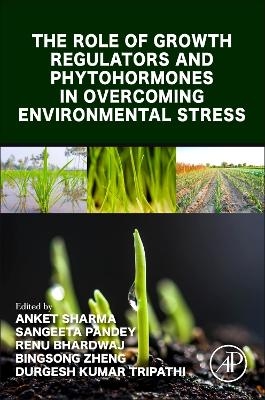
The Role of Growth Regulators and Phytohormones in Overcoming Environmental Stress
Academic Press Inc (Verlag)
978-0-323-98332-7 (ISBN)
In the present era, plants are facing a lot of challenges during their lifecycle, including growth declines due to abiotic stress. The main abiotic stresses threatening plants are water scarcity, salinity, extreme temperatures, heavy metals and pesticides. These stresses directly or indirectly cause toxicity to plants, causing hindrance to their growth and development, and ultimately reduce plant productivity.
Anket Sharma is currently working as a Visiting Research Scientist at University of Maryland, College Park, USA & as an Associate Professor (Adjunct) at Zhejiang A & F University, Hangzhou, China. Dr. Sharma has more than 100 research articles to his credit. Dr. Sharma Completed his M.Phil and Ph.D. from Guru Nanak Dev University, Amritsar, Punjab, India. Renu Bhardwaj is a Professor in Botanical and Environmental Sciences at Guru Nanak Dev University in Amritsar, Punjab, India. Dr. Durgesh Kumar Tripathi is currently an Associate Professor at Amity Institute of Organic Agriculture, Amity University Uttar Pradesh, Noida, India. He is the recipient of ‘Dr DS Kothari Post-Doctoral Fellowship’ of the UGC, New Delhi. Dr. Tripathi has received his D.Phil. in Science from University of Allahabad, India. During this period, Dr. Tripathi worked extensively on phytolith analysis, crop stress physiology, agro-nanotechnology and molecular biology. He has expertise on laser spectroscopy. His research interests encompass stress tolerance mechanisms in plants. Presently, he is working with nano-materials and their interactions with plants to find out their detoxification mechanisms, he is also working on Silicon, Nitric oxide and hormonal crosstalk against abiotic stress in plants.
1. Regulation of cell signalling in response to abiotic stresses in plants
2. Redox homeostasis in response to abiotic stresses in plants
3. Role of auxins in regulating physiological and molecular aspects of plants under abiotic stress
4. Role of abscisic acid in regulating physiological and molecular aspects of plants under abiotic stress
5. Role of cytokinins in regulating physiological and molecular aspects of plants under abiotic stress
6. Role of ethylene in regulating physiological and molecular aspects of plants under abiotic stress
7. Role of gibberellins in regulating physiological and molecular aspects of plants under abiotic stress
8. Role of jasmonates in regulating physiological and molecular aspects of plants under abiotic stress
9. Role of salicylic acid in regulating physiological and molecular aspects of plants under abiotic stress
10. Role of brassinosteroids in regulating physiological and molecular aspects of plants under abiotic stress
11. Role of nitric oxide in regulating physiological and molecular aspects of plants under abiotic stress
12. Role of melatonin in regulating physiological and molecular aspects of plants under abiotic stress
13. Role of polyammines in regulating physiological and molecular aspects of plants under abiotic stress
14. Role of low molecular organic acids in regulating physiological and molecular aspects of plants under abiotic stress
15. Role of proline in regulating physiological and molecular aspects of plants under abiotic stress
16. Role of glycine-betaine in regulating physiological and molecular aspects of plants under abiotic stress
17. Role of sugars in regulating physiological and molecular aspects of plants under abiotic stress
18. Role of plant growth promoting rhizobacteria (PGPR) in regulating physiological and molecular aspects of plants under abiotic stress
19. Role of arbuscular mycorrhizas in regulating physiological and molecular aspects of plants under abiotic stress
20. Role of endophytic bacteria in regulating physiological and molecular aspects of plants under abiotic stress
| Erscheinungsdatum | 10.07.2023 |
|---|---|
| Zusatzinfo | 140 illustrations (70 in full color); Illustrations |
| Verlagsort | Oxford |
| Sprache | englisch |
| Maße | 152 x 229 mm |
| Gewicht | 450 g |
| Themenwelt | Naturwissenschaften ► Biologie ► Botanik |
| ISBN-10 | 0-323-98332-4 / 0323983324 |
| ISBN-13 | 978-0-323-98332-7 / 9780323983327 |
| Zustand | Neuware |
| Informationen gemäß Produktsicherheitsverordnung (GPSR) | |
| Haben Sie eine Frage zum Produkt? |
aus dem Bereich


